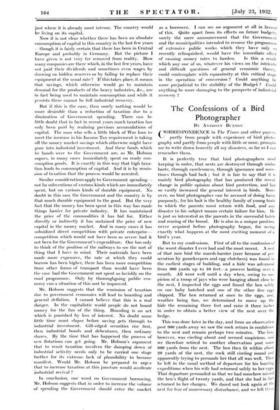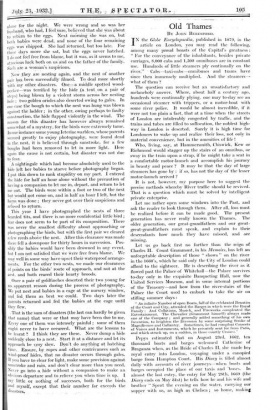The Confessions of a Bird Photographer
By ANTHONY BUXTON (101111ESPONDENCE in The Times and other paper, kJ. partly from people with experience of bird photo- graphy and partly from people With little or none, prompts me to write down honestly all my disasters, so far as I can remember them.
First of all to the confession of the worst disaster I ever had and the most recent. A ne.4 of that rare bird the marsh-harrier (rare because of per- secution by gamekeepers and egg clutchers) was found in the earliest stages of building, and a hide was advanced from 300 yards up to 10 feet—a process lasting over a month. All went well Until a day when; owing to sus- picion of a troop of jays who were hanging about close to the nest. I. inspected. the eggs and found the hen safely on one baby batched and one of the other five eggs chipped. The hen returned at once to the eggs, and, weather being fine, we determined to Move up the hide the remaining three feet and raise it three inches in -order to obtain a better view of the nest Over the hedge.
This was done later in the day, and from an observation post 303 yards away We Saw the cock return in Confidence to the nest and remain perhaps two minutes. The. hen, -however, was circling about and seemed suspicious, and we therefore retired to another observation post some 800 yards from the nest. The hen then lit Within about 20 yards of the nest, the cock still circling round and apparently trying to persuade her that all was well. Then he left in the usual method of departure for his hunting expeditions when his wife had returned safely to her eggs. That departure persuaded Us that we had somehow missed the hen's flight of twenty yards, and that she had in fact returned to heTcharges. We dared not look again at the nest for fear of unnecessary disturbance, and we left them • It is perfectly true that bird photographers need keeping. in order, that nests are destroyed through undue haste, through carelessness, through ignorance and some- times through bad luck ; but it is fair to say that it is mainly bird photography that has produced the recent change in public opinion about bird protection, and has so. vastly increased the general interest in birds. More- over, no bird photographer can be accused of doing harm purposely, for his bait is the healthy family of young birds to which the parents must return with food, and any disaster to his subject means certain failure for him, lie is just as interested as the parents in the successful hatch and rearing of the brood. He is also in a unique position, never acquired before photography began, for seeing exactly what happens at the most exciting moment of a bird's year.
• But to my confessions. alone for the night. We were wrong and so was her husband; Who had, I feel sure believed that she as about • . to retilin 6' the *eggs. Next morning„ - she Was ,ori, but' both babies were dead, arid none of the four remaining eggs wag .ChipPed. She had -returned, but too late. For three days more she sat; but the eggs:never hatched. I do not Teel free from blame, but it was, as it seems to me, atrocious luck both onns'aiid On the father of thefamily. Such are a woman s suspicions Now they_ are, nesting again, and the nest of another pair ha been been successfully Alined. To deal more. shortly my other disasters. One-7a middle spotted wood- pecker'—Was terrified by the hide .(a .tent. on a pair of, steps) being blown by a violent storm across her nesting hole ; two golden orioles also deserted owing to gales. In one case the bough to which the nest was hung was blown against the ladder ; in the other, 'owing perhaps to faulty construction, the hide flapped violently in the wind. The reason for this disaster his 'hOwever always remained somewhat of a mystery, for thehirds were extremely tame. In one instance some youngIcterine warblers, whose parents seemed greatly to enjoy photography, were found ,dead in the, nest, it is believed through sunstroke, for a few boughs had been .removed to let in more . light. Here again the cause is not certain, but disaster was not due to fear.
A nightingale which had become absolutely used to the hide left her babies to starve before photography began. I,put this down to rank stupidity on my part. I entered the, hide for half an hour alone without the precaution of haying a companion to let me in, depart, and return to let me out. The birds were within a foot or two of the nest but would not come on, and in half an :hour I left, but the harm was done ; they never got over their suspicions and relused'to- 'return: .. • .
This year I have photographed the nests of three bearded, tits, and there is.no more confidential little bird ; fear does not seem to be part of its composition. There lyas. never the, smallest difficulty about approaching or photographing the birds, but with the first pair we cleared a few reeds aboi-e the nest. After this clearance was made there fell a downpour for thirty hours insuccession. Pos- sibly the babies would haA-e been drowned in any event, but I am not satisfied that We Were free from blame. ` We . . . may well in some way have Upset their Waterproof arrange- , . . meats. ,For the other two 'nests, we made our clearances at points on the birds' route of approach, and not at the nest, and both reared their hearty broods.
. Once a .pair of goldfinches deserted, their two young for no. apparent. reason during the process of photography. We put nest and babies in a cage at the nursery, window, aid fed, them as best we could. Two days, later the parents returned and fed the babies , at the cage. until they flew. . . .
. That is the sum.of disasters (the last can hardly be given that name) that were or that may have been due to-me. A:ery one of them was intensely painful ; some of them ought never to have occurred. What are the lessons to be learnt ? I think they are these. . Never dump a hide §nddenly _close to a nest. Start it at a distance and let its approach be vsry slow. Don't, do anything at hatching time.. Ensure,. by, ropes and other contrivances such as wifid-proof hides, that no disaster occurs .through gales. If you have to clear, for light, make some provision against sunstroke and rain, and don't clear more than you need. Never go. into a, hide. without a, companion to make an obvious departure and to,relieve. you when time is up. I say little. or. .nothing of .successes, both for the . birds and myself,. except that their number far exceeds the disasters . . .















































 Previous page
Previous page